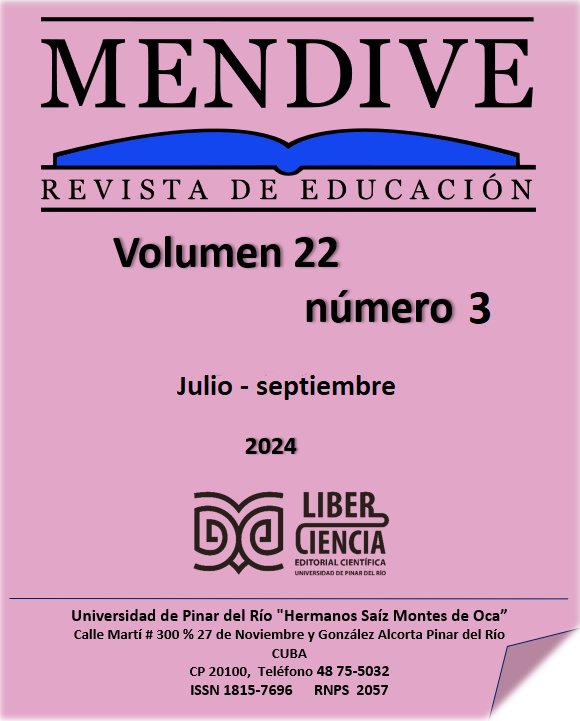Transformational model in evaluation for empowerment and transfer of learning
Main Article Content
Abstract
This study describes and deepens the use of evaluation procedures based on the participation of students regarding the objectives and achievements in their learning results, promoting evaluation processes based on empowerment and the transfer of effective learning from the evaluation. The study is based on a qualitative descriptive approach, with a non-experimental design based on intrinsic case studies. The results show that students developed critical thinking skills, collaborative work and skills to make autonomous decisions, considering the way in which students are empowered by their own evaluation processes. An issue that the teacher himself promoted during the development of the subject was that his students could reflect on their learning achievements, which facilitated the possibility of making correct decisions at the right time, changing the way in which the students approached their commitments. work and academic work on a recurring basis, giving them the possibility of choosing the way in which they were organized and the best way to present the evidence of their work to be evaluated, giving them the possibility of reviewing and correcting the results of their evaluations with their group mates. and identify their errors collaboratively, the same was done by the teacher as an effective feedback process, the students recognize that they had access to the rubrics and evaluation guidelines in advance, which facilitated their work in addition to being able to have more feedback. descriptive of its successes and errors.
Downloads
Article Details

This work is licensed under a Creative Commons Attribution-NonCommercial 4.0 International License.
References
Asensio, M. (2023). La transferencia del aprendizaje en el contexto de la administración pública: Una revisión sistemática de la literatura empírica. Revista del CLAD Reforma y Democracia, (86), 257-290. https://doi.org/10.69733/clad.ryd.n86.a8
Byrnes, JP (1996). Desarrollo durante la adolescencia temprana y media. En PA Alexander & PH Winne (Eds.), Manual de psicología educativa (págs. 87-113). Lawrence Erlbaum Associates Publishers.
Feixas, M. y Martínez-Usarralde, M. (2022) La transferencia de los proyectos de innovación docente: un estudio sobre su capacidad de transformar la enseñanza y el aprendizaje. Educar, 58(1), 69-84. https://doi.org/10.5565/rev/educar.1407
Gómez, A., & Guzmán, Y. (2013). La transferencia del aprendizaje en matemática: el caso de las funciones lineal, cuadrática y exponencial. Revista U.D.C.A Actualidad & Divulgación Científica, 16(2), 543-551 http://www.scielo.org.co/scielo.php?script=sci_arttext&pid=S0123-42262013000200030&lng=en&tlng=es
Hernández Rivero, V.M., Santana Bonilla, P.J. y Sosa Alonso, J.J. (2021). Feedback y autorregulación del aprendizaje en educación superior. Revista de Investigación Educativa, 39(1), 227-248. http://dx.doi.org/10.6018/rie.423341
Ibarra-Sáiz, M.S. y Rodríguez-Gómez, G. (2019). Una evaluación como aprendizaje. En J. Paricio Royo, A. Fernández e I. Fernández (Eds.), Cartografía de la buena docencia universitaria. Un marco para el desarrollo del profesorado basado en la investigación. (pp.175-196). Madrid: Narcea.
Mezirow, J. (2000). Learning as Transformation: Critical Perspectives on a Theory in Progress. The Jossey-Bass Higher and Adult Education Series. Jossey-Bass Publishers, 350 Sansome Way, San Francisco, CA 94104.
Mora-Vicarioli, F. (2019). Estado del arte de la evaluación de los aprendizajes en la modalidad del e-learning desde la perspectiva de evaluar para aprender: precisiones conceptuales. Revista Electrónica Calidad En La Educación Superior, 10(1), 5895. https://doi.org/10.22458/caes.v10i1.2453
Morales García, M. H., Balcázar Nájera, C. A., Priego Álvarez, H. R., & Flores Morales, J. (2021). El empoderamiento del alumno: una tendencia favorable en la educación superior. RIDE Revista Iberoamericana Para La Investigación Y El Desarrollo Educativo, 11(22). https://doi.org/10.23913/ride.v11i22.847
Prado, J.F. (2021). La educación de adultos: un acercamiento desde el aprendizaje transformacional. Conrado, 17(78), 140-144. http://scielo.sld.cu/scielo.php?script=sci_arttext&pid=S1990 -86442021000100140&lng=es&tlng=es
Perkins, D.; Salomon, G. (1992). Transfer of learning. En: International Encyclopedia of Education. Ed. Pergamon Press. (Oxford). Disponible desde Internet en: http://learnweb.harvard.edu/alps/thinking/docs/traencyn.htm
Quesada, A. (2017) Empoderamiento del alumnado en su aprendizaje. Red Social Educativa. https://redsocial.rededuca.net/node/6065
Sandín, M.P. (2003). Investigación Cualitativa en Educación. Fundamentos y Tradiciones. Madrid: Mc Graw and Hill Interamericana de España (pp.258)
Scarsi Maratuech, R. M., Pérez Gutarra, G.D., & Cristobal Tembladera, C.M. (2021). Empoderamiento en estudiantes universitarios de enfermería desde la percepción del clima organizacional. Revista Vive, 4(12), 647658. https://doi.org/10.33996/revistavive.v4i12.121
Tai, J., Ajjawi, R., Boud, D., Dawson, P. y Panadero, E. (2018) Developing evaluative judgement: enabling students to make decisions about the quality of work. High Educ. 76: 467-481. http://doi.org/10.1007/s10734-017-0220-3
Taberneiro, R. (2015). Empoderamiento de la evaluación en el aprendizaje autónomo. Revista ciencias de la educación, (46), 71-82. https://dialnet.unirioja.es/servlet/articulo?codigo=7472476
Yang, M., Lowell, V.l., Talafha, A. Et Al. (2020). Transfer of Training, Trainee Attitudes and Best Practices in Training Design: a Multiple-Case Study. Techtrends, 64, 280-301 https://link.springer.com/article/10.1007/s11528-019-00456-5


